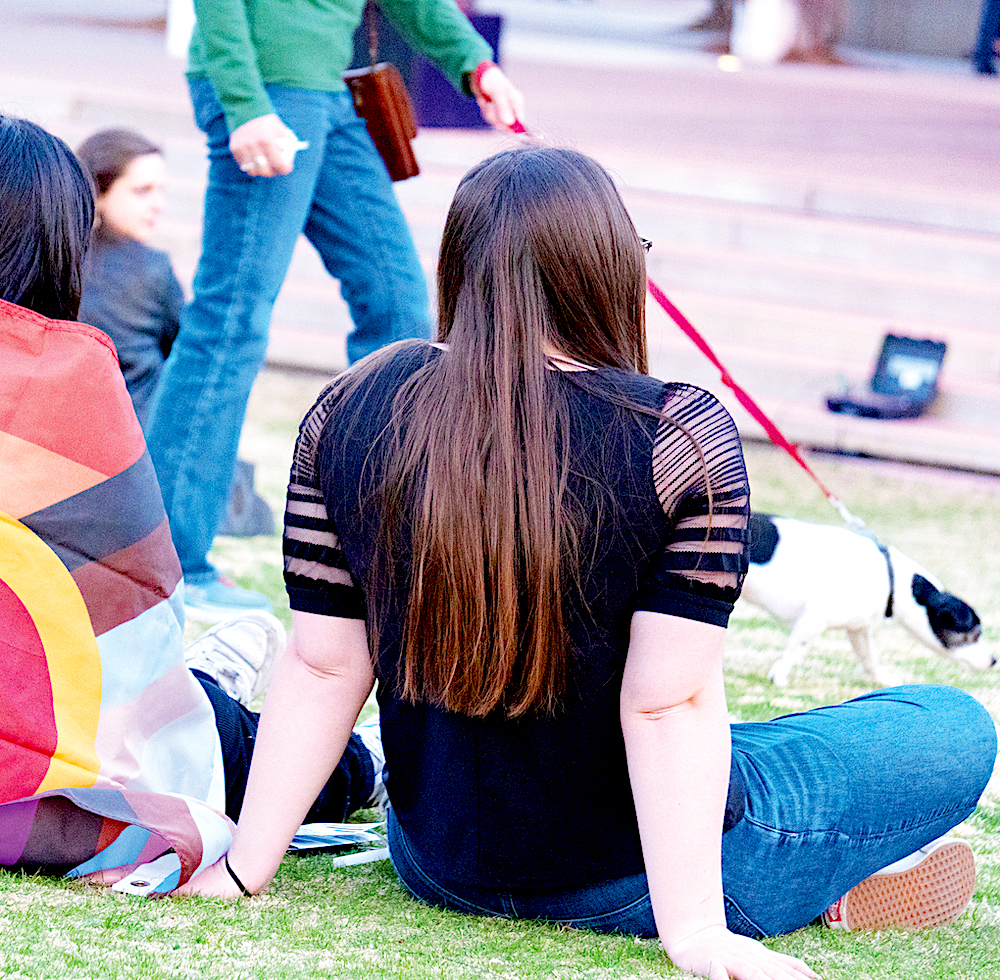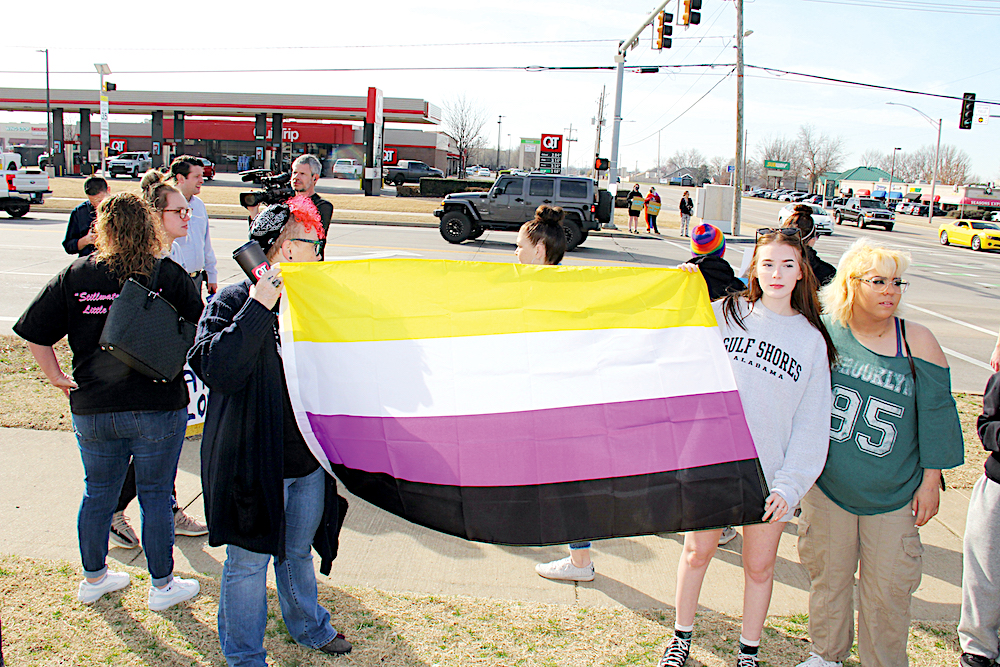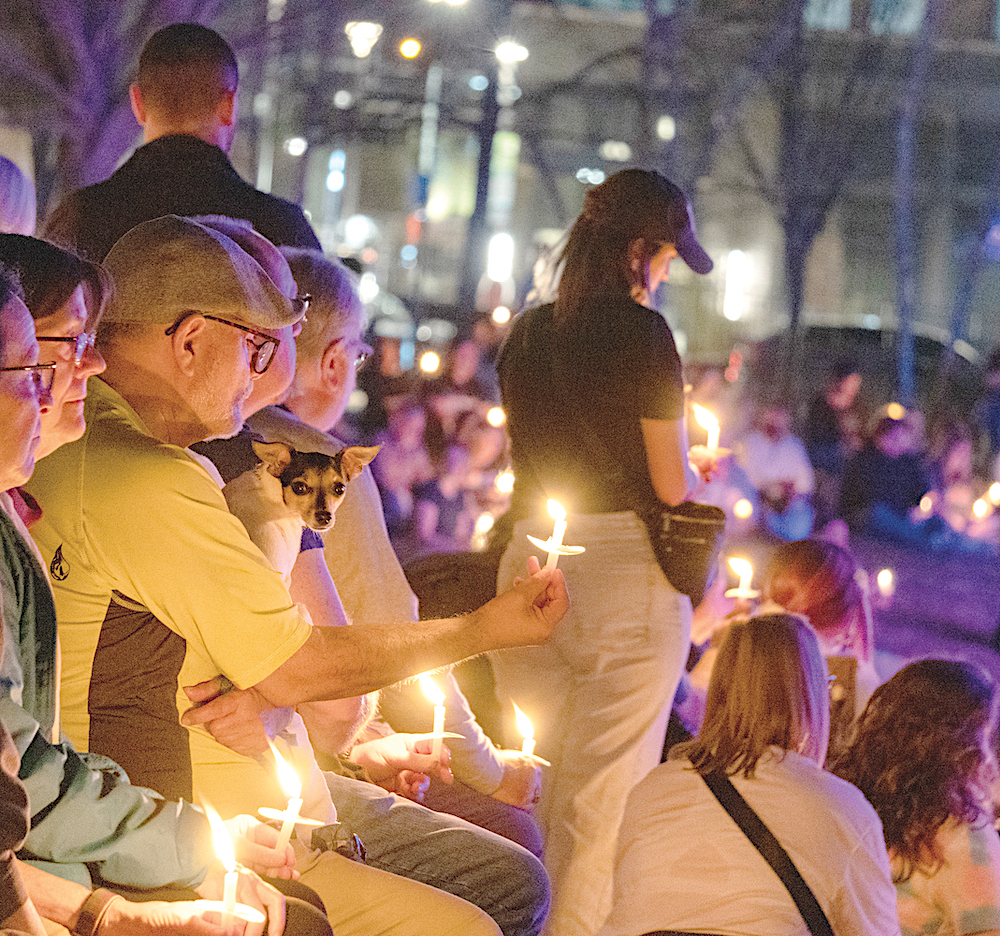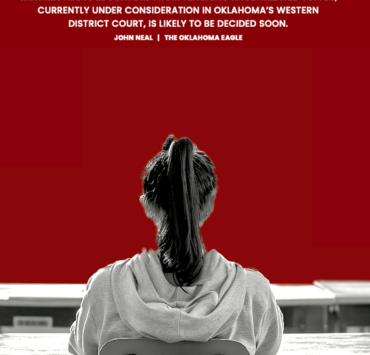
LOCAL & STATE
Gary Lee
Illustration. The Oklahoma Eagle
Owasso, Okla. – On the morning of Feb. 26, a group of gender equality advocates and supporters gathered on a busy intersection in this Tulsa suburb, in the shadow of Owasso High School, where two weeks earlier, three students bullied and beat Nex Benedict, a 16-year-old sophomore at the school who identified as non-binary.
Benedict died the next day in Bailey Medical Center, a hospital a few blocks away from the scene of the rally. The crowd, mainly composed of Owasso High students (about 40 of whom had joined a walk-out protest) and alumni, LGBTQ+ advocates, and concerned citizens from the town of Owasso or nearby Tulsa, wanted to support Nex and their family.
Using banners, short speeches, and interviews, they praised the courage and dignity of the 16-year-old who had been a straight-A life-loving student unabashed about their Queer identity.
“We’re here to raise up the memory of Nex and aid their family at this difficult time,” Sue Hudson, one of the participants, told The Oklahoma Eagle. Hudson, who identifies as Queer, had driven from Tulsa for the event. “Through all the sadness and anger, it makes me happy to know that so many people are showing up to express their solidarity.”

Protesting anti- LGBTQ+ culture
But attendees of the rally were more than a support group. They came to push back. In interviews with The Oklahoma Eagle, many said that a big part of their mission was to protest the anti-LGBTQ+ culture at the school and across Oklahoma.
“It’s a culture of hate” explained Aren Deakins, one of the protestors. “It’s a culture created by conservative politicians, negligent school administrators, and right-wing citizens in Oklahoma that gave rise to a situation where a death like Nex’s could occur, and no school official, hospital, or other person of authority would take responsibility for what happened.”
“It’s that culture that needs to change, and until it does, it will be hard to protect Queer people like Nex,” added Deakins, a 2018 Owasso High School graduate, who identifies as Queer.
“This is a case of a missing and murdered kid who was Queer,” said Jordan Harman, one of the activists, in an interview with The Oklahoma Eagle. “I have questions. One big one is: Why was this student not protected from bullying? We want answers.”
Jordan, based in Tulsa, also identifies as Queer and is a member of
Two Spirits (www.twospirits.com), a support group dedicated to building a safe space for Queer Indigenous people.

The latest battleground
The conservative Oklahoma town of Owasso (pop. 40,000) is the latest battle site in a war over LGBTQ+ rights that has been taking place across the U.S. for the past couple of years.
In 2022, students and activists across Florida staged school walkouts in response to legislation — dubbed the “Don’t Say Gay” bill — that would prohibit discussing sexual orientation and gender identity in the state’s primary schools. The statement passed the Florida legislature and was signed into law by Gov. Ron DeSantis in 2022.
In 2023, North Dakota rights activists launched protests against several bills conservative lawmakers tried to pass. One of the most disputed statutes, which allows teachers to ignore the pronouns of transgender students, was passed and signed into law.
In this 2024 election season, LGBTQ+ rights are emerging as an increasingly tense issue on the national level and in various states.
In 2023 and 2024, Oklahoma’s GOP-controlled legislature also tried to push through a record number of bills that would undercut the rights of the state’s LGBTQ+ community. According to the account of the American Civil Liberties Union, conservative Oklahoma lawmakers have introduced 54 bills that target LGBTQ+ rights – more than any other state.

History of anti-LGBTQ+ culture
The fight for gender equality is far from new to Oklahoma, a state whose population includes around 138,000 people who identify as part of the LGBTQ+ community – or 3.8 percent of the population, according to a survey by the William Institute at the Law School at UCLA. Of that total, nine percent are Black, nine percent are Indigenous, 12 percent are LatinX, and most of the rest are white, according to the Williams Institute’s account.
Nicole McAfee, executive director of Freedom Oklahoma, used her speech at a vigil in Tulsa to set the record straight on the ongoing fights between gender equality advocates and conservative state lawmakers. Nex’s story was not a wake-up call,” she said. “We’ve been screaming for help.”
“We know that no one is going to come to save us but us,” McAfee added.
The LGBTQ+ leader said earlier actions by the state were “all new versions of old tactics meant to isolate and cause despair” in the LGBTQ+ community.
However, several aspects of Benedict’s case have merited particular attention. One is the victim’s youth. The case has highlighted the harrowing plight of LGBTQ+ students in Oklahoma.
In the wake of Benedict’s death, youth in Oklahoma are increasingly seeking help from crisis hotlines, according to new data from the Rainbow Youth Project (RYP).
The Indiana-based nonprofit, one of several organizations that provides LGBTQ+ mental health crisis counseling via the national 988 hotline, reported last week that they received 349 calls from Oklahoma between Feb. 16-20. That compares to an average of 87 weekly calls from Oklahoma before Benedict’s death.
Of the Oklahomans who called the hotline, two-thirds said they were experiencing distress about Benedict’s death, by the Rainbow Project’s account. Eighty-five percent said they also experienced bullying at school or online, and seventy-nine percent feared for their physical safety. More than 10 percent were students or parents of students at Owasso High.
The intersection between Benedict’s sexual orientation and ethnic background has also raised the profile of the case. Benedict was descended from Choctaw Natives, one of the tribes that were moved to Oklahoma in the early 1800s. In Oklahoma, home to 39 tribal nations, Queer indigenous people have found unity in the Two Spirit culture. Two Spirit is an umbrella term meant to unify various gender identities and expressions among Indigenous, Native American, Alaskan Native, and First Nations people.
Benedict identified as non-binary and used the pronouns they/them and he/him. Non-binary is defined as “a person whose gender identity does not conform to the gender binary, which is the erroneous idea that only two distinct and opposite genders exist, male and female.”
Questions about how Owasso local school district administrators managed Benedict’s situation – and other bullying instances – are among the most niggling in this episode.
In an interview with police in the hospital, Benedict reported that three students had been bullying them. Benedict said they threw water on the other students. The bullies then jumped Benedict in the bathroom and beat them. During the fight, Benedict lost consciousness. Following the war, school administrators declined to report the incident to the City of Owasso Police Department. They also reportedly suspended the attackers and Benedict. They recommend Benedict seek medical treatment. Bendict’s mother took them to Bailey Medical Center.
The handling of the case appears to follow a pattern in which school administrators assign blame to both the perpetrator and victims of altercations. While Owasso school officials declined interview requests, several students confirmed the policy of punishing both victims and perpetrators in school fights.
Amethyst Johnson, a 15-year-old student at Owasso Hish who identifies as Queer, described a “culture of constant hate” against LGBTQ+ students at the school.
Johnson said that other students have bullied and harassed them regularly. The school does little to punish the bullies or control the anti-LGBTQ+ atmosphere.
Johnson reported that in November 2023, several students bullied him like Benedict’s incident. School officials summoned him and the attackers and suspended them all.
“I don’t think that’s a fair policy,” Johnson told The Oklahoma Eagle. “If the school did not protect bullies and attackers, what happened to Nex could have been avoided.”

Owasso school officials respond
School administrators in Owasso have issued statements expressing their condolences and clarifying that they do not tolerate bullying.
Brock Crawford, a spokesman for the Owasso school district, told news media that the school investigates every bullying report.
“As a district, the safety and security of our students is our top priority, and we are committed to fostering a safe and inclusive environment for everyone,” he said in an email. “Bullying in any form is unacceptable.”
On March 1, the U.S. Department of Education said it is investigating Owasso High School’s treatment of Benedicts’s case.
The Human Rights Campaign (HRC), a national organization fighting for LGBTQ+ rights, filed a complaint with the department following Benedict’s death. The federal investigation is the first response to HRC’s complaint.
Another big unanswered query in the case is what was Benedict’s cause of death? In a preliminary report, Owasso Police Department said that their death was not a result of the trauma of the fight they endured at the high school the previous day.
However, independent medical experts interviewed by The Oklahoma Eagle questioned that conclusion. One Tulsa-based medical doctor, who asked not to be named because they had not read a full medical report, said that it was premature to make any assessment about the cause of death until a full autopsy is conducted.
Medical examiners are conducting a complete autopsy. Benedict’s family has also said that they are pursuing an independent examination.
On Sunday evening, Feb. 25, several hundred locals gathered at Guthrie Green in downtown Tulsa to mourn Benedict’s life and offer support to the LGBTQ+ community in Tulsa, Owasso, and throughout Oklahoma. With candles glimmering in the dusk of an unseasonably mild evening, the event exhibited the warmth and breadth of feeling and support for Benedict and their untimely passing.
Following prayers, over two dozen speakers supported Benedict, their family, and other LGBTQ+ youth. Among them were Dr. Tiffany Crutcher, founder of the Crutcher Foundation and a social activist, and Daniel McHenry, founder of the group Black Queer Tulsa. Both pointed out that Black and brown Tulsans are also frequent victims of anti-—LGBTQ+ discrimination.
State Rep. Melissa Provenzano (D-79, Tulsa) was one of the early speakers.
“I just want to call on you to listen to every kid, even those who take up much of your time. Please just listen, and when they say they are being bullied, sit down, dig in, and find out what is going on. Lastly, look at the overwhelming response that has occurred nationwide. Look at this and know you are not alone. Focus on your community, helping and supporting each other, and be proud. No matter who you are, your appearance, or how you choose to live. No one deserves to be bullied and harassed. Thank you for being exactly who you are.”
Speakers blasted Oklahoma lawmakers
As speaker after speaker took to the podium, many also used the occasion to lay the blame for Nex’s death on Oklahoma’s anti- LGBTQ+ public officials and the rules they have issued to beat back the rights of the community.
Whitney Cipolla, a board member of Oklahomans For Equality, which advocates for the LGBTQ+ community, summed up the sentiments of other speakers well.
“Book bans curriculum bans bathroom bills, denying gender-affirming health care prohibiting showing any sign of visibility or support for the queer community. That distracts us from the real issues we’re facing in Oklahoma — the leaders making these decisions. I want them to know they are not protecting our youth. They are actively doing harm.”
She added, “I want to say to the youth here tonight. I am so sorry that so many of the adults in this state have failed you, but I also want you to know that there are also so many adults across the state who love you and want to see you thrive, not just survive.”
More than 350 organizations – from both in and outside Oklahoma – that support LGBTQ+ rights sent a letter last week to leaders in the Oklahoma Legislature calling for the removal of the Oklahoma State Superintendent for Public Instruction, Ryan Walters. They said his policies “disproportionately target and impact transgender, nonbinary, and gender expansive youth.”
The group addressed the correspondence to Oklahoma House Speaker Charles McCall (R-22, Atoka) and other leading members of the state legislature.
Besides demanding Walter’s removal, the letter asks the legislators “to begin an investigation” into the Oklahoma State Department of Education, which Walters leads, to determine what actions and policies have led to the anti- LGBTQ+ culture.
With a federal investigation of Owasso schools and an autopsy of Nex Benedict underway, many key details are hanging in the air. But the past week gave those who advocate for safer schools and fairer treatment of the LGBTQ+ community a call to order.
Tulsa City Council member Laura Bellis (D-4) summarized it well during her speecj the Guthrie Green vigil in Tulsa. “This is part of a systematic effort to erase queer people from public life and it will not succeed,” she said.
“Our decision makers within our public education system are accountable for keeping all of our kids safe. Our kids have rights to they have the right to be safe when they’re in school and identify who they love,
We can work to prevent hate crimes and bullying in schools. There are concrete things we can do. Let’s do them.”









